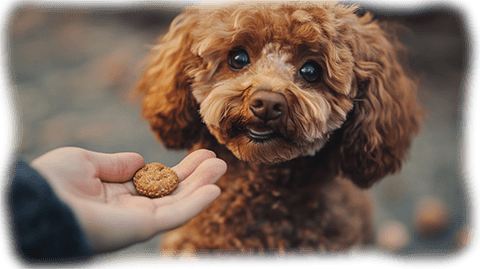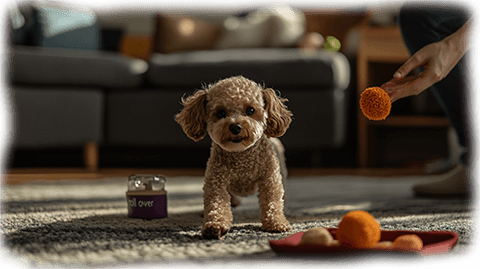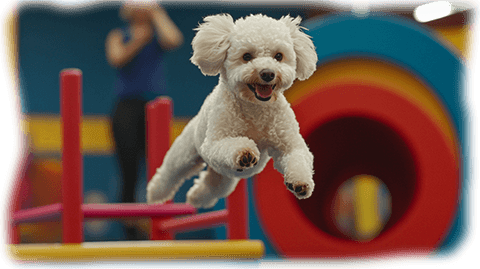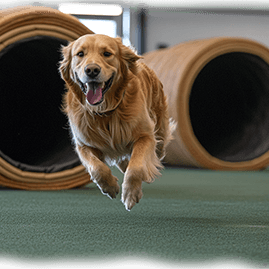Why Train a Poodle?
Poodles are highly intelligent and active dogs. While this makes them quick learners, it also means they need both mental and physical stimulation to prevent boredom, which can lead to undesirable behaviors like excessive barking or destructive chewing.
Training a Poodle isn’t just about obedience—it’s about keeping their mind sharp and ensuring they are well-adjusted, happy pets. A well-trained Poodle is a joy to have, whether you’re teaching basic commands, advanced tricks, or participating in agility sports.
General Tips for Training a Poodle
Poodles are highly sensitive and respond best to positive reinforcement techniques. Consistency, praise, and patience will go a long way in training them.

- Use Positive Reinforcement – Reward your Poodle with treats, praise, or play whenever they follow a command or behave well. Avoid harsh punishment, as Poodles can be sensitive and may become anxious if scolded too much.
- Keep Sessions Short – Poodles learn fast but can also get bored easily. Aim for multiple short training sessions throughout the day rather than one long one. A session of 5-10 minutes can be more effective.
- Start Early – If you have a Poodle puppy, begin training right away. Puppy brains are like sponges, and the sooner you start teaching commands, the easier it will be for them to learn and adapt.
- Be Consistent – Use the same commands, hand signals, and rewards each time to avoid confusing your dog. Consistency across all family members is key.
- Mental Stimulation – Poodles are thinkers. Keep their minds active by teaching them tricks, using puzzle toys (Amazon affiliate link), or participating in dog sports like agility or obedience competitions.
Basic Training for Poodles
Start with the essential commands. These commands form the foundation of more advanced training and ensure your Poodle is well-behaved in everyday situations.
Sit
Teaching “sit” is one of the most fundamental commands and is often the first command taught.
- Hold a treat in front of your Poodle’s nose. (Amazon affiliate link)
- Slowly raise the treat above their head. As their nose follows the treat, their bottom will naturally lower to the ground.
- Once they sit, immediately praise and reward them with the treat.
- Repeat consistently, adding the word “sit” as soon as they perform the action.

Stay
“Stay” is important for keeping your Poodle in place, especially in busy or dangerous environments.
- Start by asking your Poodle to sit.
- Hold your hand out, palm facing them, and say “stay.”
- Take a step back. If they stay in position, praise and reward them.
- Gradually increase the distance and duration of the stay command, always rewarding them for successfully staying in place.
Come
A reliable recall (“come”) is essential for your Poodle’s safety, especially in off-leash environments.
- Start indoors or in a fenced area with little distraction.
- Squat down, call your Poodle’s name, and say “come” in a cheerful voice.
- As they approach, praise them excitedly and offer a treat or toy.
- Practice often, increasing the distance and eventually trying in areas with more distractions.
Advanced Training
Once your Poodle has mastered the basics, you can introduce more advanced training. Poodles excel in tasks that challenge their intelligence.
Trick Training
Poodles love learning new tricks because it keeps their minds engaged and strengthens your bond.
- Roll Over – Start with your Poodle in a down position. Hold a treat near their nose, then slowly move it in a circular motion so they follow the treat and roll over.
- Play Dead – Teach this by asking them to lie down, then gently guide them onto their side with a treat, using the command “play dead.”

Agility Training
Poodles, especially Standard Poodles, are excellent candidates for agility training. This involves running through obstacle courses (Amazon affiliate link) with commands to jump, weave, or balance. Agility provides a physical and mental workout and taps into their need for activity.
Common Poodle Training Challenges
Even with their intelligence, Poodles can face some training hurdles. Here’s how to address common issues:
- Separation Anxiety – Poodles are people-oriented and may develop separation anxiety if left alone too long. Crate training and desensitizing them to being left alone can help ease their anxiety.
- Barking – Poodles are alert and may bark excessively if they aren’t properly stimulated or socialized. Train them to respond to the “quiet” command, and ensure they get enough exercise.
- Jumping Up – Poodles can be excitable and might jump up to greet people. Teach them to sit when greeting people and reward calm behavior instead of excitement.

Resources for Poodle Training
Here are some additional resources to help you with training your Poodle:
- Books:
- “The Complete Poodle Training Guide” (Amazon affiliate link) by Erin Hotovy
- “Poodles for Dummies” (Amazon affiliate link) by Susan M. Ewing
- Training Tools:
- Clicker – Great for marking the exact moment your dog performs the desired action.
- Treat Pouch – Handy for quick access to treats during training sessions.
Conclusion
Training a Poodle can be a rewarding experience, thanks to their intelligence, eagerness to please, and versatile nature. Whether you’re focusing on basic obedience or more advanced tricks, the key is consistency, positive reinforcement, and keeping the training process fun and engaging. With patience and dedication, you’ll have a well-trained Poodle that’s both well-behaved and mentally stimulated.
Happy training!
Affiliate Disclosure
This post may contain affiliate links, which means I earn from purchases made through links. Please see the privacy policy page for more details.





